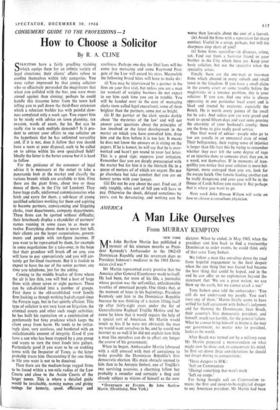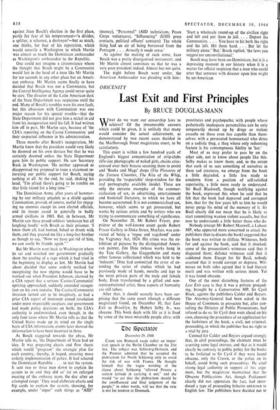A Man Like Ourselves
AMERICA
From MURRAY KEMPTON
NEW YORK
MR John Bartlow Martin has published a memoir of his nineteen months as Presi- dent Kennedy's Ambassador to the 1962-63 Dominican Republic and his seventeen days as President Johnson's mediator in the 1965 Domi- nican civil war.*
Mr Martin represented every promise that the America after General Eisenhower made to itself. He had been, for most of his life, a journalist whose passion was the unfamiliar, unfashionable troubles of Unnoticed people. One thinks that, at the moment of hope in his beginnings, President Kennedy sent him to the Dominican Republic because he was thinking of a nation lifting itself up after thirty-eight years under the fist of Generalissimo Raphael Trujillo Molina and be- cause he knew that it would require the help of a special sort of American. Mr Martin would touch us less if he were not obviously the man we would want ourselves to be, and he would not instruct us so well if he did not explain how little a man like ourselves can do to affect any longer the course of his government.
When he began, Ambassador Martin laboured with a skill unusual with men of conscience to make possible the Dominican Republic's first democratic election. His main obstacle seemed to him then to be Antonio Imbert, one of Trujillo's two surviving assassins, a charming fellow but probably a swindler and certainly a thug and already subject to visions of himself as the next
* OVERTAKEN BY Evmrs. By John Bartlow Martin. (Doubleday, New York.) dictator. When he ended, in May 1965, when the president sent him back to find a trustworthy Dominican to order events, he could think only of that same Tony Imbert.
We follow a man like ourselves down the road from hopeful engagement to the final despair when the one thing that was feared had become the best thing that could be hoped, and in the end he can offer us no explanation beyond the statement that 'We are a great nation, we can blow up the earth, but we cannot crack a nut.'
Tony Imbert once told the ambassador: 'You still do not understand my people. You can't trust any of them.' Martin finally seems to have settled for half-agreement with Imbert's judgment and for blaming the Dominicans, Juan Bosch, their country's first democratic president, and himself, much too harshly, for the general failure. What he cannot bring himself to blame is the way our government, no matter who its president, looks at the world.
After Bosch was turned out by a military coup Mr Martin prepared a memorandum on what might now be done and, to concentrate his mind, he first set down three considerations he should not forget during its composition:
'Three dangers to JFK : 'Soft on Communism '(Doing) something that won't work 'Soft on coups.'
For being thought soft on Communism re- mains the first and never-to-be-neglected danger
to any American president. Mr Martin had been against Juan Bosch's election in the first place, partly for fear of his temperament—`a divider, a splitter, a schemer, a destroyer'—but as much, one thinks, for fear of his reputation, which would unsettle a Washington to which Martin was almost as much the Dominican ambassador as Washington's ambassador to the Republic.
One could not imagine a circumstance where the thought that Bosch might be a Communist would last in the head of a man like Mr Martin for ten seconds in any other place but an Ameri- can embassy. Mr Martin seems finally to have decided that Bosch was not a Communist, but the Central Intelligence Agency could never quite be sure. The director of the Latin American desk of the State Department was suspicious until the end. Many of Bosch's troubles were his own fault, but this obsession with Communism was one major reason for his special trouble—that the State Department did not give him a nickel in aid from his inauguration until his fall. It had written him off in fart, Mr Martin says, because of 'the CIA's reporting on the Castro Communists' and their suspected influence in his administration.
Three months after Bosch's inauguration, Mr Martin knew that the president would very likely be doomed on his own devices but that he was certainly doomed unless the State Department gave him its public support. He saw Secretary Rusk in Washington. 'He neither approved or disapproved my proposal to issue a statement re- iterating our public support for Bosch, saying nothing at all. At the end, he said, shaking his head, "I'm afraid there's going to be trouble on that little island for a long time."' The Dominican Army, after years of hammer- ing by our military attaches as a shield against Communism, proved, of course, useful for engag- ing no enemies except its own elected officials, and its troops caved in generally to badly armed civilians in 1965. But, in between, Mr Martin saw these proud soldiers 'unshaven but all laughing loudly' with Bosch as their prisoner. 'I knew them all, had hunted, fished or drunk with them, and they greeted me like a long-lost brother as though to say, "Now we have got rid of him, we can really be friends again."' But Mr Martin went back to Washington where he sat and watched our government gradually show the cooling of a rage which it had tried in the beginning to display as hot. Mr Martin had about decided that some orderly method for recognising the new regime would have to be worked out when President Johnson, alarmed by a CIA report that a serious 'Castro/Communist' uprising approached, suddenly extended recogni- tion on his own impulse. The Castro/Communist invasion turned out to be imaginary, as had a prior CIA report of imminent armed revolution under more respectable auspices; our government had made policy decisions on both; the CIA's authority is undiminished, even though, in the only four cases where Mr Martin tells us that the United States made up its mind on the single basis of CIA information, events later showed the information to have been incorrect in three.
As Bosch staggered towards the abyss, Mr Martin tells us, 'the Department of State had an idea. It was preparing charts and flow sheets which would "program" the strategic plan for each country, thereby, it hoped, ensuring more orderly implementation of policy. It had selected the Dominican Republic . . . to test the system. It sent two or three men down to explain the system to us and they did so' (at an enlarged meeting of the embassy team, the day after an attempted coup). 'They used elaborate charts and flip cards to explain the system, showing, for example, under "input" such things as "AID" (money), "Personnel" (AID technicians, Peace Corps volunteers), "Influencing" (USIS press contacts, political officers' contacts). The whole thing had an air of being borrowed from the Pentagon . . . Actually it made sense.'
As against the making of such sense, Juan Bosch was a pretty disorganised instrument; and Mr Martin almost convinces us that he was a very poor president indeed. Almost but not quite.
The night before Bosch went under, the American Ambassador was pleading with him : `Start a wholesale round-up of the civilian right and left and put them in jail. . . . Deport the Communists. . . . You have to hit both the right and the left. Hit them hard. . . . But let the military alone.' But,' Bosch replied, 'the laws you suggest are unconstitutional.'
Bosch may have been un-Dominican, but it is a depressing moment in our history when it is a matter for official suspicion that a man who could utter that sentence with disaster upon him might be un-American.







































 Previous page
Previous page